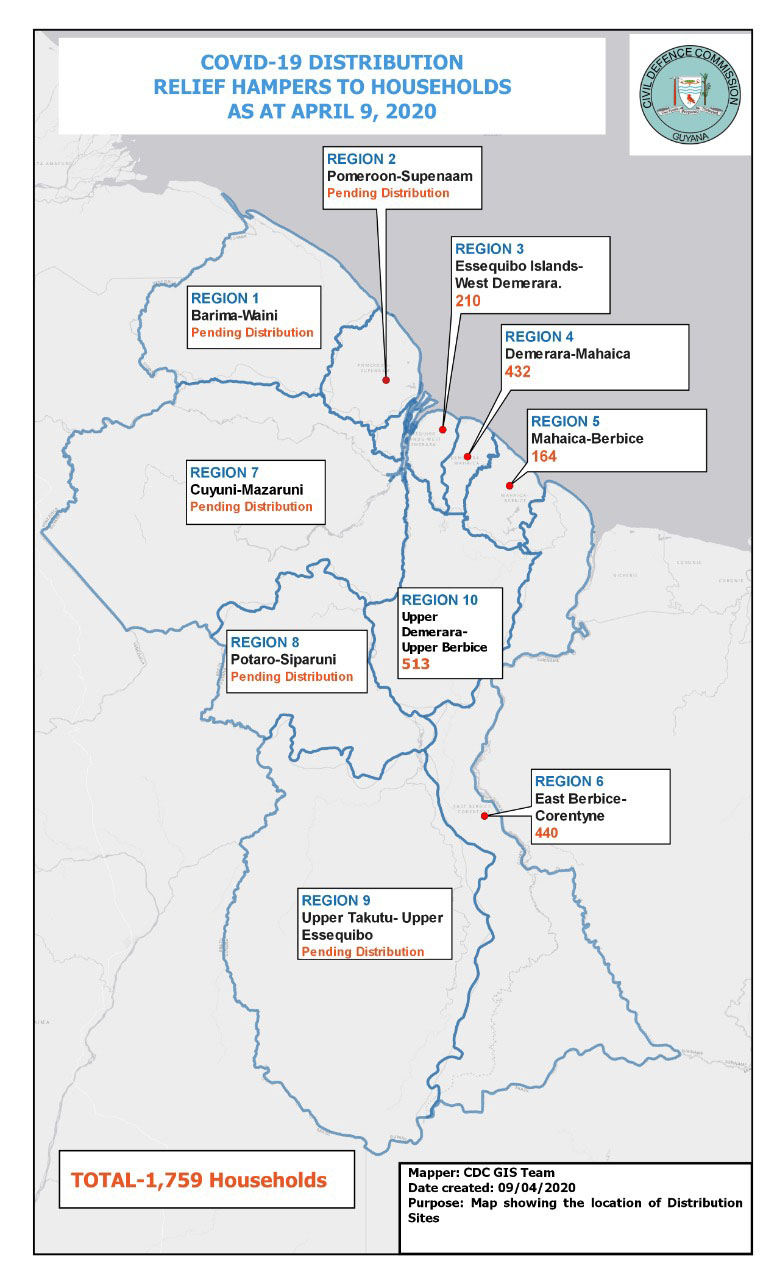Up to last Thursday, the Civil Defence Commission (CDC) distributed food hampers to 1,759 households as part of its work to bring relief to citizens during the current month-long emergency curfew instituted by the Ministry of Public Health in response to the novel coronavirus disease (COVID-19) pandemic.
The beneficiaries, who are from 25 communities in regions Three, Four, Five, Six and Ten, have received hampers containing a month’s supply of food items, according to a Ministry of the Presidency release.
Captain Salim October, CDC Senior Response Officer, was reported as saying in the release that the success of the exercise, which began on April 5, has been achieved through careful coordination between CDC’s National Emergency Operations Centre (NEOC) and local Non-Governmental Organizations (NGOs), governmental agencies, Regional Democratic Councils (RDCs), Community Liaisons and some members of the private sector.
He further noted that members of the private sector have been supportive of the CDC’s efforts, while several NGOs have provided volunteers to help with the door-to-door delivery of the hampers.
“The CDC recognises that for the entire nation to benefit and for efforts to be maximized, it requires broad based interventions by as many organisations and entities as possible. At this juncture, the CDC recognises that similar initiatives to provide relief to citizens are being implemented by various organisations, including NGOs, international and local agencies and individuals. As the national authority for disaster risk management, we are heartened by these wide-ranging, noble and humanitarian driven acts that no doubt will rebound to increase food security for many. The CDC publicly acknowledges the supportive agencies and organisations, and applauds their efforts in mobilising support and conducting community outreaches. These efforts demonstrate our resilience as a people,” he was quoted as saying.
Meanwhile, Director General of the CDC Lieutenant Colonel Kester Craig added that while some citizens might believe that the Commission is moving too slow in its distribution efforts, they must be cognizant of the fact that while it had the foresight to procure supplies beforehand, the situation has drastically changed from then to now. He noted that the entire world is grappling with the pandemic and, therefore, it is a challenge to mobilise resources, for which the entire world is competing.
In light of the challenges, Craig noted that the CDC in collaboration with key stakeholders conducted reconnaissance, assessments and analyses and the neediest and most vulnerable communities were the recipients of the first batch of supplies. Further, distribution and procurement plans have already been developed to direct the process based on the availability of the required resources.
“This is not to say that we are not trying our best. We have challenges and despite those challenges, we are still working to ensure that the citizens are taken care of during this time. We have tried, as far as practicable, to touch those communities which are most vulnerable and who would be most impacted during these measures. However, our intention has always been to ensure that every vulnerable citizen benefit, so we are trying to work out those challenges,” he said.
Craig added that the CDC has noted that several public and private entities and individuals are coordinating similar distribution interventions across the country. He recommended that all distribution be coordinated through one system to avoid duplication of efforts and to maximise resources. “The CDC stands ready to work with government, non-governmental, private sector and other agencies to coordinate a comprehensive distribution effort which reaches the entire vulnerable population,” he said, while pointing out that the partnership could be activated by donating supplies directly to the CDC, through joint distributions in the communities or the sharing of logistics and distribution information.
“At minimum, the CDC would be appreciative if organisations which are engaged in their own distribution activities can inform us ahead of time so that such efforts can be factored into our national distribution planning. We are confident that your assistance in this regard would help to mitigate the duplication of relief efforts as we respond to the challenges and impacts of COVID-19. Kindly contact the National Emergency Management System (NEMS) at 600-7500 or 623 – 1700 to update us on any relevant information. We welcome your continued partnership and support,” he further noted.
Apart from its distribution of food supplies, the CDC has donated masks to frontline agencies, such as the Diamond Diagnostic Centre, the Georgetown Public Hospital Corporation, the Immigration Department and the Guyana Revenue Authority to ensure that adequate resources are available for the protection of workers.
Companies or persons who wish to donate are reminded that they can do so at the CDC’s headquarters, Thomas Road, Thomas Lands or make cash or cheque deposits into its Republic Bank account, #962356519938. Food and hygiene supplies can be dropped off at the Thomas Lands headquarters between 9am and 3pm daily.






